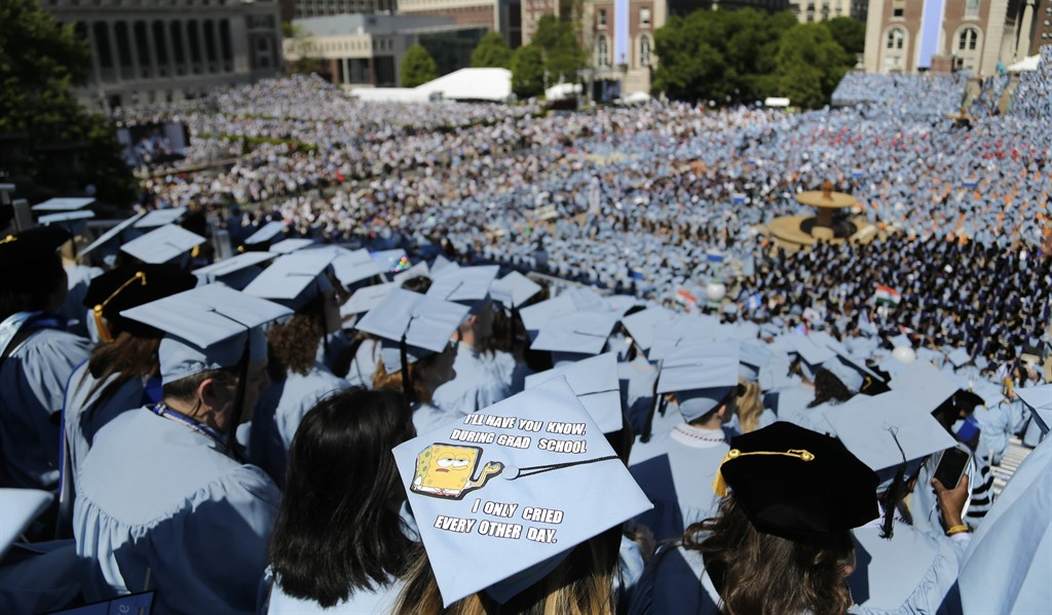Among the many crises currently afflicting the United States, the deteriorating conditions on the nation's university campuses and a collapse in the public's trust in institutions of higher education probably don't receive the amount of attention they merit. But this is part of the reality that we're facing and a new Gallup survey supports that idea. A college education is more expensive than ever and a majority of survey respondents indicated that the cost simply isn't worth it, with the entire higher education system heading in the "wrong direction." Barely one-third of survey participants expressed a "great deal" or "quite a lot" of confidence in our higher education system, while interest in entering the trades continues to be on the rise. (US News and World Report)
Americans are increasingly skeptical about the value and cost of college, with most saying they feel the U.S. higher education system is headed in the “wrong direction,” according to a new poll.
Overall, only 36% of adults say they have a “great deal” or “quite a lot” of confidence in higher education, according to the report released Monday by Gallup and the Lumina Foundation. That confidence level has declined steadily from 57% in 2015.
Some of the same opinions have been reflected in declining enrollment as colleges contend with the effects of the student debt crisis, concerns about the high cost of tuition and political debates over how they teach about race and other topics.
This is something that Mike Rowe has been harping on for years. There are certain fields of endeavor where a college education is completely appropriate if not a necessity. But the country only has room for so many doctors and lawyers or genetic engineers. There is a lot of work to be done out there and opportunities still abound, but much of that work can be done (and is being done) by people who went through trade schools or simply learned the ropes through apprenticeship programs. And those people didn't walk away from their educational experience with hundreds of thousands of dollars of debt hanging over their heads like the sword of Damocles.
Far too many colleges and universities aren't doing themselves any favors these days by "reimagining" the entire college experience. That's been true over the past year more than ever. There have always been demonstrations showing up on college campuses dating back to at least the Vietnam War era. But protests were a sideline activity. They weren't the entire purpose of going to college. Course selection was intended to be a critical part of the process, building a student's academic resume in a way that made them best prepared for their chosen vocation and most attractive to potential employers after graduation.
Why would anyone want to invest that sort of money in a system that focuses more on diversity, equity, and inclusion than actual career development? If the majority of a student's time is going to be spent figuring out how to divest the school's revenue stream away from Israel and take over or ransack buildings, there aren't many well-paying careers waiting on the horizon. Having worked for a number of employers in the fields of both media and technology, I can assure you that successful companies don't give a hoot about how "diverse" you are. They want to know if you can get the job done and advance the company's objectives.
One survey respondent from Connecticut noted that his nephew is currently preparing to graduate from high school. He's already enrolled in a welding apprenticeship program sponsored by a local labor union. Once his training is complete he will be eligible for any number of well-paying jobs. As the housing crisis drives even more demand for new construction, welders will be flooded with work offers. And his nephew will not be saddled with paying tuition bills every year. Other examples abound across all of the trades.
Rather than being shocked at these poll results, I'm actually more surprised that the number of people who still have a great deal of confidence in the higher education system was even close to one-third. There are still a few good schools out there to be sure, but they are growing few and far between. Don't expect that to change any time soon unless we begin seeing a significant shift in public attitudes and perceptions.








Join the conversation as a VIP Member